- Home
- Craig Alanson
Trouble on Paradise: an ExForce novella (ExForce novellas Book 1) Page 2
Trouble on Paradise: an ExForce novella (ExForce novellas Book 1) Read online
Page 2
The Major’s salute was picked up by the people ringing the field, and if the three had any doubts, they squashed them and continued forward until they reached the bottom of the transport’s ramp. There, the two hulking Kristang prodded them forward with the muzzle of their rifles. The Kristang shuffled forward until they disappeared into the transport. The ramp closed, and the transport took off unevenly, dragging itself forward then flying low, churning up and destroying crops as it flew. Black smoke poured from one engine, before the engine sound changed and the smoke became thin and white. The transport gained speed rapidly, and was lost from sight beyond the jungle trees.
Gomez shuddered. Fifty people, all good people; people who had sacrificed their futures in order to protect the billions of humans on Earth. He did not expect to ever see them again.
“We wait here,” Surmacz held up a hand to halt the column the next afternoon.
“What’s up, Sergeant?” Koblenz asked quietly.
“We have to cross a river, so we’ll be marching along this road,” he pointed ahead to a bright line across their path. A place where there was a gap in the dense interlocking canopy of trees overhead. The jungle concealed the marchers from satellites, although everyone expected Ruhar sensor technology would not be degraded by something as simple as tree cover. The purpose of staying off the roads was to avoid UNEF troops who might be using the roads. “The road has a bridge across the river. We wait here until an hour before dark, then we cross the bridge. To save you from asking me more stupid questions, Koblenz, we are waiting because there is a regular UNEF patrol that drives along this road every afternoon. After those hamvees pass by, we get on the road and cross the bridge.”
“We’re not going to ambush that patrol?” Markey asked.
“No,” Surmacz shook his head. “Too hard a target for us; they’ll be inside their hamvees. We don’t have anything,” he pointed to the collection of crude weapons carried by the team, “that can penetrate that glass the hamsters use.” Surmacz knew that in the steamy afternoon heat of the jungle, the patrol would have their hamvee windows rolled up and the air conditioning on. The ‘glass’ of hamvee windows was a tough clear composite material that an arrow or spear, even a large rock, would bounce right off. On Camp Alpha, Surmacz had seen a demonstration that a hamvee window could stop a 9MM round at close range. He remembered being amazed that a 9MM round left no more mark on the window than if a large bug had hit the window at highway speed. The standard 5.66MM NATO round from an M4 rifle didn’t fare much better against the Ruhar glass; it took an explosive-tipped Kristang round to punch through the composite. And the Kristang advised more than one hit was needed to be sure to make a hole in the ‘glass’. “We’ll let those boys ride right by us.”
After their forward lookout reported that three UNEF hamvee patrol vehicles had rolled by, the Keeper team tentatively stepped out onto the road. Sergeant Surmacz had assured them there were no UNEF soldiers nearby so they could talk normally, but most people were walking without speaking. Early evening in the jungle of Lemuria reminded Eric Koblenz of a summer evening back home. Towering clouds were tinged orange and golden by the rays of the setting sun. Insects were already buzzing or chirping on both sides of the road. The typically gusty midday wind had died down and the air was absolutely still, without even a breath of a breeze. The thunderstorms that rolled across the jungle every afternoon like clockwork had been brief that day, so that the dirt road had quickly dried out, and boots kicked up puffs of dust as they marched. It was peaceful, and by unspoken agreement, people didn’t want to break the quiet that wrapped around them like a comforting blanket. Or, they were all lost in thought, and maybe many of them were thinking of home; a planet they would probably never see again.
“You’re quiet,” Markey nudged Koblenz and almost whispered. “What’s going on with you? You’re usually a freakin’ motormouth.”
Eric Koblenz looking guiltily toward Staff Sergeant Surmacz. “Does this sit right with you?”
“What part of it?” Markey answered quietly. “Being on another planet? Or the planet being controlled by the enemy? Or that the Ruhar may not be our enemy?”
“Shit,” Koblenz’s breathed out a defeated sigh. “All of that. This is way too freakin’ complicated. I’m a soldier, I have a rifle. Point me toward a target and I’ll do my duty. Out here, I’m being asked to decide who the enemy is.”
“We can’t tell the enemy from the good guys?” Markey shrugged. “Hell, the US Army has been fighting that way since Vietnam, ain’t nothing new. Iraq, Afghanistan, Nigeria; all the Hajis look the same.”
“Yeah, I guess. Here, the Hajis are us.”
“How you figure that?”
“We’re not marching to attack the hamsters; we’re on our way to hit humans. UNEF or not, they’re humans. Humans could get killed, by other humans. How fucked up is that?”
Markey nodded. “F’ed up for certain, man.”
“I’m doing what I think is the right thing, but,” Eric grimaced and looked up at a cloud. Surprisingly, it had rained only briefly that day, and the air was suffocatingly hot. “I came all the way out here to do my duty, and if UNEF HQ ever reports back to Earth, they’ll say I went Elvis on them,” he said sadly, using slang for a soldier absent without leave.
“Hey,” Markey gripped Koblenz’s shoulder reassuringly. “We didn’t go over the hill on UNEF; they abandoned their mission on us.”
Koblenz looked sadly down at his dusty boots. “We’re in a jungle, on an alien planet, and I must be homesick, because this reminds me a lot of home. You know, walking down a dirt road on a summer afternoon, kicking up dust. Coming back from a swimming hole, or fishing, or whatever. Walking home,” he blinked to clear tears from his eyes. “Damn,” he wiped his eyes with the back of a hand, “this dust is getting to me.”
“Yeah, the dust,” Markey agreed, suddenly thinking of his own home in Kentucky. Thinking of when he was a boy, walking along the dirt road behind his parents’ house. Walking with a group of friends, coming back from a creek where there was a deep pool of water perfect for cooling off on a hot summer day. “Where’s home for you?”
“West Virginia,” Koblenz answered. “My folks have a place up in a holler, that’s a valley-”
“I’m from eastern Kentucky, I know what a holler is,” Markey had to blink away his own tears. “West Virginia, huh?”
“Almost heaven,” Koblenz said with a quickly fading grin.
“I’ve been there, my mother’s parents are from Beckley.”
Koblenz nodded. “I miss it. And now I think I’m never going to see it again.”
Markey watched Eric Koblenz hang his head miserably, staring at his boots as they marched. Markey patted the other soldier on the back, and began to sing softly. “Almost heaven, West Virginia. Blue Ridge Mountains, Shenandoah river. Life is old there-”
Koblenz joined him, neither of them having any talent for singing and not caring. “-older than the trees. Younger than the mountains, blowin’ like the breeze.”
Six other soldiers around them picked up the familiar chorus, singing louder. “Country roads, take me home, to the place I belong. West Virginia, mountain momma. Take me home, country roads.”
Then the whole column sang, even Sergeant Surmacz. “All my memories gathered ‘round her. Miner’s lady, strangers to blue water. Dark and dusty, painted on the sky, misty taste of moonshine, teardrops in my eye. Country roads, take me home, to the place I belong. West Virginia, mountain momma. Take me home, country roads-”
When they finished the last chorus, even Surmacz had tears in his eyes. “Ah, dammit, now you guys have got me going.”
“Where’s home for you, Sergeant?” Markey asked.
“Alabama,” Surmacz said wistfully. And of course, that started the entire group singing Sweet Home Alabama, making Sergeant Surmacz have to join in.
Captain Chisolm sat rigid with his back to a rock, trying to control his ragged breathing. There was a soldier
to his right and one to his left, also gasping for air as quietly as possible. All three of them gripped their Chinese rifles so tightly their knuckles were white; Chisolm knew that was bad practice, he also couldn’t order his own fingers to ease their grip at the moment.
Chisolm and two others. As far as he knew, they were the only survivors of the fifty humans and six Kristang who launched the assault on the Ruhar-held projector site. The display in the Kristang goggles he wore, connected to his zPhone, showed less than sixteen minutes had passed since the dropship landed and fifty four warriors raced out to charge the Ruhar position. Because the dropship had been forced to fly low and land behind a hill to avoid Ruhar antiaircraft missiles, the landing zone had been a kilometer and a half from the Ruhar forward positions. To make contact with the enemy, Chisolm and the other humans had to run over a kilometer, uphill, through dense jungle in the steaming heat. In what Chisolm took as a bad omen, the sky had opened as a brief storm pounded the area with rain, almost as soon as his feet stepped off the aircraft’s ramp.
The assault plan, as explained by the Kristang during the rough flight as they were all crammed in the back of the aircraft, was simple. Captain Chislom and the forty nine other humans would charge straight at the Ruhar, making as much noise and causing as much havoc and confusion as possible. Three of the Kristang, wearing awe-inspiring powered armor suits, would swing around to the right, hoping to outflank the Ruhar defenders and gain direct access to the shaft being dug down to the projector. The two Kristang pilots, no doubt knowing they were on a certain suicide mission, brought their aircraft in fast and low from the left, strafing the Ruhar positions but being careful not to hit the projector site.
The sixth Kristang, who had the misfortune of not having a powered armor suit, went up the center with the humans. Officially, the Kristang with the humans was there to provide leadership and guidance on tactics. In reality, he was there to ‘encourage’ the untrusted humans to attack with true warrior spirit. Chisolm quickly saw that meant their Kristang guide shooting in the back anyone who hesitated even slightly. The first victim to fall was a soldier who stopped running forward because of a large tree down across his path. After first trying to climb over the log and slipping on the mossy growth that covered the rotting trunk, the soldier fell back to the ground and backed up two steps to go around the worst of the tangled branches. That momentary retreat of two steps earned the human a single shot to the back of his head. Chisolm had been startled to hear the distinct report of a Kristang rifle, and turned just in time to see the now headless soldier’s body slumping forward.
Captain Chisolm was not the only human to have second thoughts about their forced alliance with the Kristang right then. And he was not the only one to consider turning his own rifle on the vicious Kristang; Chisolm saw several rifle muzzles begin to swing toward their Kristang ‘leader’. “Keepers! Forward!” Chislom found himself shouting to his own surprise, years of Army training taking over and saving his life for a few more minutes. The Kristang was not wearing a powered armor suit, but he was a genetically-enhanced super warrior who had a better than even chance to shoot first at anyone who pointed a rifle in his direction. And he was wearing some sort of composite armor panels covering his torso, head, arms and thighs. Chisolm’s brain had taken in all those facts as he decided without thinking to continue the charge rather than shooting in rage at their ‘leader’.
That particular Kristang was satisfyingly dead as Chislom huddled behind the rock, working up the oxygen and courage to stand up and run forward. Chisolm had seen the Kristang die, sliced apart and burned by masers. The Ruhar preferred directed-energy weapons to kinetic rounds, although their rifles also could fire explosive-tipped darts that were propelled by an undermounted railgun. To defeat the masers and particle beams of their usual enemy, Kristang armor was designed to flake and ablate away when struck by a beam, protecting the user. The armor could not hold up against being struck by multiple beams, nor could it stop beams from penetrating gaps in the armor. The Kristang had gone down when a maser cooked his shoulder through a gap in the armor. As his head tilted back, another maser had deflected off his chest armor and searing energy seeped through the seam between the chest armor and the neck of his helmet. Seeing the Kristang’s skull being boiled from inside and then exploding against the faceplate of his helmet had been both horrifying and satisfying at the same time for Chisolm. Then Chisolm had no more time for reflection, as the jungle was crisscrossed by masers and he needed all his attention to stay alive.
The attack had been a disaster from the start, although Chisolm had been surprised by the poor performance and lack of coordination by the Ruhar defenders. As soon as the ground team left the aircraft and began running through the jungle, the Kristang launched handfuls of miniature flying drones, to counter the Ruhar drones that were already in the air. The fierce drone battle lasted less than a minute as Chisolm and his fellow soldiers ran through the jungle, fearfully glancing at the sky. When the drones finished tangling across the sky, neither side had a single functional drone in the air.
The two Kristang pilots were the first to die from enemy action; their aircraft had barely cleared a hilltop to begin strafing the Ruhar when they were hit simultaneously by four of the six missiles launched by the Ruhar. The burning wreckage of the aircraft cartwheeled through the jungle, knocking down trees and sending splinters flying in every direction. Not a single splinter of wood reached the Ruhar positions; the sacrifice of the aircraft had been for nothing. The air power portion of the assault was an utter failure, except that once the Ruhar no longer faced a threat from above, they seemed unsure of what to do. During the flight in, Kristang had told Chisolm and his fellow Keeper soldiers that the Ruhar were overly reliant on air power and seldom practiced ground-only fighting tactics. This fact was the chief hope of the six Kristang to take on a Ruhar prepared defense, with only the support of fifty primitive humans.
“Ready?” Chisolm asked the soldiers on either side of him, and they both nodded in quick, jerky motions reflecting their fear. Chisolm checked the magazine of his Chinese Army QBZ-95 rifle. Somewhere, the Kristang had gotten access to Chinese weapons, and that is what they provided to Chisolm and his team. Few of the Keepers had ever handled such a weapon, and Chisolm had found the ‘bullpup’ style rifle, with its curved magazine behind the trigger, to be awkward. He kept bashing the magazine into his hip, and it was difficult to fire from a prone position. At least the Kristang had provided plenty of explosive-tipped ammo of the funky 5.8MM size used by the Chinese rifle. Chisolm ejected the half-empty magazine and inserted a full one, figuring he would not have enough time remaining in his life to swap magazines in combat. He took three deep, calming breaths and prepared to order a final assault. The purpose of the attack by three humans would not be to take the Ruhar position. They had no hope of accomplishing that. What they could accomplish would be to demonstrate to Kristang, across their star-spanning empire, that human allies could and would fight to the death.
Perhaps the assault never had a chance, Chisolm thought as he steeled himself to stand. The three Kristang in powered armor had all been killed without succeeding in outflanking the Ruhar defensive positions around the excavation site. Rather than the wave of human cannon fodder providing cover for the armored Kristang, the opposite had happened. Apparently, the Ruhar commander quickly decided three armored Kristang warriors were a greater threat than a group of lowly humans. That decision, and the poorly-coordinated, hesitant response by the Ruhar, were the reason Chisolm and two others were still alive. Why they had gotten within fifty meters of the Ruhar defensive line. Gotten close enough that Chisolm had seen the excavation site through the jungle, before raking fire that killed a dozen others forced him to momentarily take cover behind the rock.
Cruel as their Kristang ‘leader’ had been in shooting or stomping to death anyone who failed to run absolutely flat-out through the jungle, Chisolm saw the wisdom in the tactic of simply rushing forward as
fast as possible. Their only hope for success, for survival, was to catch the Ruhar off guard, to hit them and be upon their defensive line before the hamsters could adjust to the surprising threat.
That fact of speed being preferable to cover was still true as Chisolm huddled behind the rock. In the few seconds they had taken cover there, the Ruhar could have outflanked them. Chisolm had seen Ruhar soldiers run, and they could seriously move, even burdened by weapons and their own body armor panels. “We go on three. Three, two, GO!” Chisolm shouted, springing to his feet and running. He collided shoulders with the soldier to his left, making both of them stumble for a step as the soldier to their right was cut down by a pair of maser beams. Chisolm had barely time to trip over a tree root before a rocket exploded at the feet of the other soldier, throwing the man’s body into Chisolm. Captain Chisolm fell, losing grip on his rifle, then his helmet slammed into a tree trunk.
CHAPTER TWO
Four days after Skippy used maser cannon projectors to destroy the Kristang battlegroup at Paradise
General Marcellus, acting chief intelligence officer for UNEF HQ, remained soberly silent after the conclusion of the briefing from the Ruhar officer. The briefing, given by an angrily resentful Ruhar officer, had been ordered by Deputy Administrator Logellia. The Ruhar military had already been embarrassed and angry about the content of the briefing; to air their dirty laundry in front of two humans was almost too much to bear. Seated beside Marcellus, US Marine Corps General Bailey was also silent, mulling over in his mind what they had learned during the previous thirty seven minutes.
What they had learned was that the Ruhar were not perfect, fantastically advanced though their genetically engineered bodies and their technology were. Their super soldiers were not invincible. Based on their performance in the battle during which a well-armed Ruhar security team had nearly been overrun by six Kristang and fifty humans, the Ruhar were not even competent ground troops. Marcellus thought that, if the battle had been a wargame and he had commanded the defense as an Army captain, he would have received a scathing chewing out by his superiors afterward, and been sent for remedial training in infantry warfare tactics.

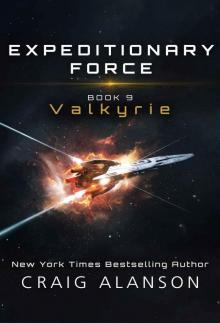 Valkyrie (Expeditionary Force Book 9)
Valkyrie (Expeditionary Force Book 9)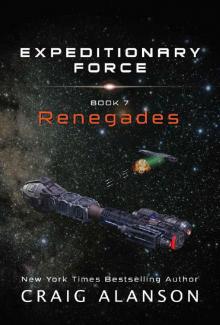 Renegades (Expeditionary Force Book 7)
Renegades (Expeditionary Force Book 7)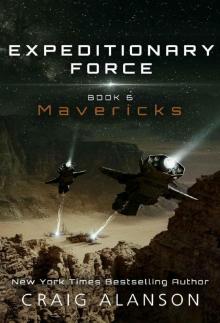 Mavericks (Expeditionary Force Book 6)
Mavericks (Expeditionary Force Book 6)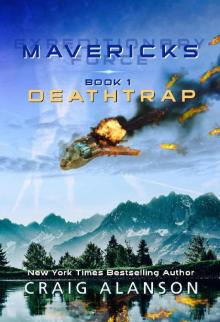 Deathtrap
Deathtrap Armageddon
Armageddon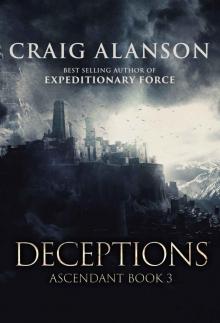 Deceptions (Ascendant Book 3)
Deceptions (Ascendant Book 3)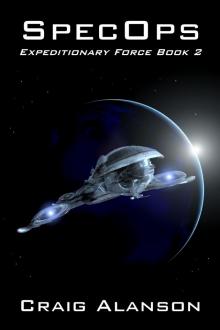 SpecOps (Expeditionary Force Book 2)
SpecOps (Expeditionary Force Book 2)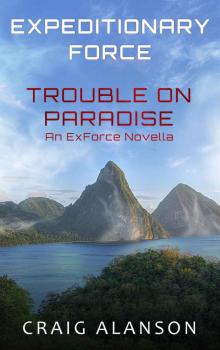 Trouble on Paradise: an ExForce novella (ExForce novellas Book 1)
Trouble on Paradise: an ExForce novella (ExForce novellas Book 1) Transcendent (Ascendant Book 2)
Transcendent (Ascendant Book 2) Columbus Day (Expeditionary Force Book 1)
Columbus Day (Expeditionary Force Book 1)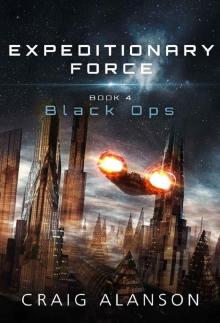 Black Ops (Expeditionary Force Book 4)
Black Ops (Expeditionary Force Book 4)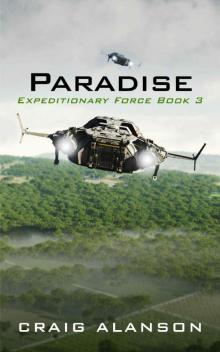 Paradise (Expeditionary Force Book 3)
Paradise (Expeditionary Force Book 3)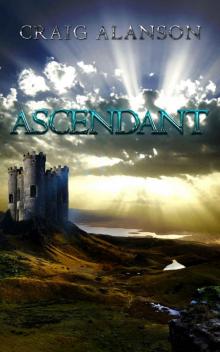 Ascendant
Ascendant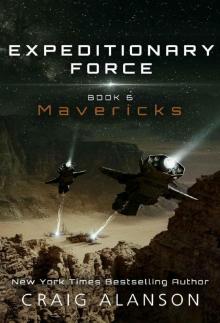 Mavericks
Mavericks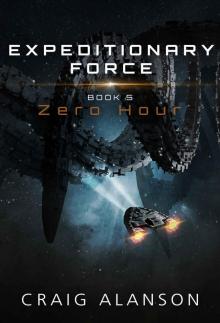 Zero Hour (Expeditionary Force Book 5)
Zero Hour (Expeditionary Force Book 5)